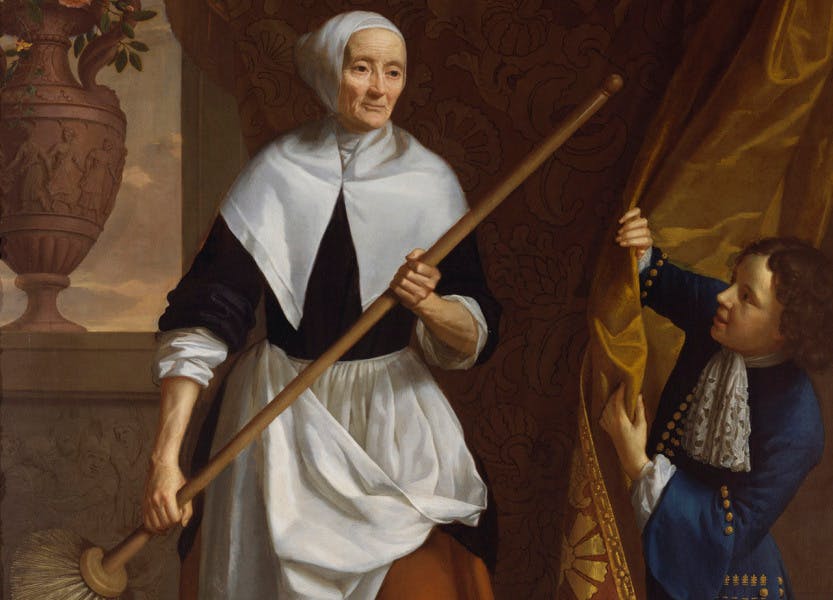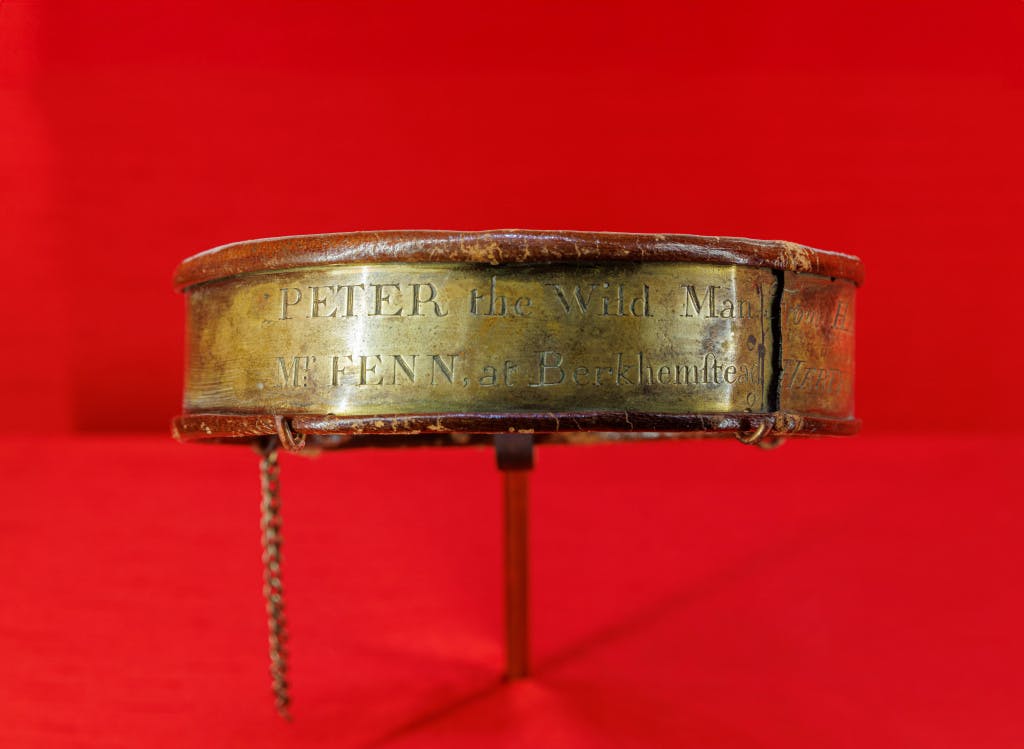Peter 'the Wild Boy' from Hanover: The Boy on the Staircase
Date: 11 March 2024
Author:
Emma Shepley
In April 1726 the arrival of a 'wild youth' in the Great Drawing Room of St James's Palace caused a London sensation. A boy in his early teens had been found in German woods 'wild, naked… and knowing nobody'.
Brought to England by George I to 'have all the instruction possible to fit him for human society', he was nicknamed Peter 'the wild boy'. Briefly famous, Peter was hailed as a 'wonderful wonder' in the press before spending the rest of his life in the tranquil obscurity of a Hertfordshire farm.

Image: Peter depicted on the King's Staircase at Kensington Palace. © Historic Royal Palaces
His manners are first to lick people’s hands, and then turn his Breech upon them; to thrust his hand in to everybody’s pockets, to climb over people’s heads, and even to make use of the Royal hand… he seized upon the Lord Chamberlain’s staff, put on his hat before the King...
Jonathan Swift, 'It Cannot Rain, But it Pours', 1726
Peter still gazes down at visitors to Kensington Palace today. His life-size portrait on the King's Staircase was painted just months after his arrival in England and viewers are reminded of Peter’s woodland origins by the oak leaves and acorns in his hand.
Tales of 'feral' children, lost or abandoned, without language or raised by animals in the wilderness fascinated the Georgian court. Plucked from the forests of Hanover to 'the society of all the wits and beaus of the age,' Peter was treated variously as an experiment, a novelty, a joke, a status-enhancing curiosity and a sub-species of human.
Wild rumours circulated: Peter had been suckled by a cow or a she-wolf, walked 'on his hands and feet', climbed up trees 'like a squirrel', and ate grass and moss. None of this was true.
Many men of some eminence in the literary world have published strange opinions and ill-founded conjectures about him [Peter].
Parish Register of Northchurch, Hertfordshire, c. 1785
We do know that after Peter’s initial discovery in 1725, he was sent to meet George I at Herrenhausen, his Hanover summer palace, before travelling to London at the request of Caroline, Princess of Wales who 'loved to see odd persons' and pleaded for the boy as a 'present'.
Dressed in a bright blue suit Peter charmed the Royal family on his first appearance with his 'merry disposition'. He played with Caroline's gloves, was fascinated by a chiming pocket watch, and attempted to pickpocket the guests.
This night I saw the wild boy, whose arrival here hath been the subject of half our Talk this fortnight. He is in the keeping of Dr Arbuthnot, but the King and Court were so entertained with him that the Princess [of Wales] could not get him till now.
Jonathan Swift, 1726
Peter was installed at Leicester House, Caroline's London residence, under the care of physician and writer Dr John Arbuthnot. Arbuthnot tried unsuccessfully to teach Peter to speak, by mouthing the letters of the alphabet. He administered punishment with a 'broad leather strap' and Peter was baptised at his house.
With tuition a failure and Peter still displaying 'a natural wildness in all his behaviour', Caroline passed Peter's care to her woman of the bed chamber, Mrs Charlotte Amelia Tichborne, nee Molesworth. 'Emotional and imaginative' Tichborne had three children herself and may have provided some motherly care. Tichborne was a friend of Lady Mary Wortley Montagu, pioneer of smallpox inoculation, and her children were amongst the first wave of aristocracy inoculated. We can speculate that Peter too might have been similarly protected.
Through connections in rural Hertfordshire, Tichborne recommended Berkhamstead farming brothers James and Thomas Fenn as Peter’s permanent guardians. Peter was under the Fenn’s care by 1727 at the Haxter’s End and later Broadway farms, but occasionally visited Caroline at court. At first, Fenn planned to exhibit the boy publicly, but Peter later worked as a labourer, perhaps tending the farm's innovative red clover and swede turnip crops. His carers received a royal pension of £35 a year.
Peter the Wild Man of Hanover. Whoever will bring him to Mr Fenn at Berkhamsted shall be paid for their trouble.
Engraving on Peter's collar, so Peter could be returned home when he wandered off, c.1750s

Image: Peter depicted as an older man. Wellcome Collection. Public Domain Mark. Source: Wellcome Collection.
Apart from occasional wandering, Peter lived peacefully in Berkhamsted until his death of old age in 1785. A few years earlier, Lord Monboddo, a writer on the origins of language visited Peter and described the gentle old man he found. Music delighted Peter - he could sing a tune and clap. He enjoyed simple pleasures - standing in the warmth of the sun, sitting by a fire or being out on a starry night.
While we can be relieved today that Peter's later years were spent in a safer, kinder place, compassion for Peter is not limited to our era. Robinson Crusoe author, Daniel Defoe chastised his fellow writers for making Peter 'a great something out of nothing', asking Peter himself for forgiveness and reflecting deeply on the loneliness of the boy's silent, displaced state.
The ending of this undertaking is not to make you laugh, especially not at [Peter]... an object of great compassion and so I treat him all along.
Daniel Defoe, 'Mere Nature Delineated', 1726
Sources and Further Reading
- Defoe, Daniel, Mere Nature Delineated, 1726
- Newton, Micheal, Savage Girls and Wild Boys: a history of feral children, 2003
- Swift, Jonathan, It Cannot Rain, but it Pours, 1726
- Worsley, Lucy, Courtiers: The Secrets of the Georgian Court, 2011

Untold Lives
Until 27 October 2024
A new exhibition at Kensington Palace, uncovering the forgotten stories of those who worked at the royal palaces over 300 years ago.
More from our blog

'The new Terrors of Death': Dr John Arbuthnot, Queen Anne’s favourite physician
11 March 2024
Dr John Arbuthnot was among the army of medical specialists who were summonsed to serve the Royal family in the 18th century. Arbuthnot is little remembered today, but he was 'the Queen’s favourite physician' — a gentle-mannered confidante to courtiers, politicians, poets, writers and ladies-in-waiting alike.

Royal Wetnurses: the 'Foster Mothers' of the Georgian Nursery
24 March 2022
Ahead of Mother's Day, we share the lesser-known histories of the women employed as wetnurses in the Royal Nursery. Taking on the role of 'foster mother' to young princes and princesses, they often developed a close personal bond with the royal family and received mementos that were passed down in families for generations.

A Glimpse into the World of Two Royal Cooks
11 March 2024
When it came to conjuring up the smell and heat of long-abandoned royal kitchens for Untold Lives, we turned to two cooks’ books which won’t be found on today's kitchen shelves.

